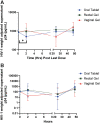A Randomized, Open-Label, Crossover Phase 1 Safety and Pharmacokinetic Study of Oral Maraviroc and Maraviroc 1% Gel (the CHARM-03 Study)
- PMID: 34384282
- PMCID: PMC9048171
- DOI: 10.1089/AID.2021.0096
A Randomized, Open-Label, Crossover Phase 1 Safety and Pharmacokinetic Study of Oral Maraviroc and Maraviroc 1% Gel (the CHARM-03 Study)
Abstract
The Combination HIV Antiretroviral Rectal Microbicide-3 (CHARM-03) study was a randomized, open-label, crossover Phase 1 safety and pharmacokinetic (PK) study of oral maraviroc (MVC) and MVC 1% gel. At a single site, healthy HIV-uninfected men and women were enrolled and randomized to an open label crossover sequence of eight consecutive daily exposures to MVC 300 mg dosed orally, MCV 1% gel dosed rectally, and MVC 1% gel dosed vaginally. Male participants received oral and rectal dosing and female participants received oral, rectal, and vaginal dosing. Assessments were undertaken at baseline and following each 8-day period and included collection of plasma, rectal/cervical tissue (CT), and rectal/endocervical/vaginal fluids. Eleven men and nine women were enrolled. Two participants withdrew from the study before receiving study product. There were 25 adverse events, of which 24 were Grade 1 (G1) and one was G2 (unrelated). After eight doses, MVC was quantifiable in all samples following oral, rectal, or vaginal product administration. The highest drug concentrations in plasma, rectal tissue (RT), and CT were associated with oral, rectal, and vaginal drug delivery, respectively. There were significant reductions in tissue drug concentrations when rectal and cervical biopsies were incubated in media before tissue processing for PK (p < .0001). Only oral MVC was associated with limited protection in the rectal explant HIV challenge model (p < .05). There were no immunological changes in RT, and all products were acceptable to participants. In conclusion, all products were found to be safe and acceptable and did not induce local inflammation. The lack of ex vivo efficacy demonstrated in study samples may be due to rapid disassociation of MVC from the explant tissue. ClinicalTrials.gov Identifier: NCT02346084.
Keywords: HIV; maraviroc; microbicide; prevention; rectal.
Conflict of interest statement
I.M.M.: is an employee and has stock in Orion Biotechnology. C.W.H.: research funding (Gilead Sciences, ViiV/GSK, and Merck) Scientific Advisory Board (Gilead Sciences, ViiV/GSK, and Merck), Safety Monitoring Committee (Orion Biotechnology), and Founder/Officer of Prionde Biopharma. M.A.M.: research funding (Gilead Sciences, ViiV/GSK, and Merck). J.C.E.: is an employee and has stock in Orion Biotechnology. A.R.: is an employee and has stock in ViiV Health care. B.C.: research support from Medicines 360 and Sebela Pharmaceuticals. S.L.A.: research funding from EvoFem Biosciences and Merck and consulting fees from Merck. S.C., P.A.A., R.M.B., L.C.R., K.Z.A., N.R.-H., A.S., J.S., R.S., H.S., C.E.J., E.K., and R.D.C.: no competing financial interests exist.
Figures



References
-
- Beyrer C, Sullivan P, Sanchez J, et al. : The increase in global HIV epidemics in MSM. AIDS 2013;27:2665–2678. - PubMed
-
- Baral SD, Poteat T, Stromdahl S, Wirtz AL, Guadamuz TE, Beyrer C: Worldwide burden of HIV in transgender women: A systematic review and meta-analysis. Lancet Infect Dis 2013;13:214–222. - PubMed
-
- Sullivan PS, Jones JS, Baral SD: The global north: HIV epidemiology in high-income countries. Curr Opin HIV AIDS 2014;9:199–205. - PubMed
Publication types
MeSH terms
Substances
Associated data
Grants and funding
LinkOut - more resources
Full Text Sources
Medical

